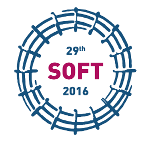Speaker
Seungyon Cho
(National Fusion Research Institute)
Description
Chemical compatibility between Korean reduced activation ferritic-martensitic alloy (ARAA) and lithium meta-titanate breeder was investigated under operation conditions; high temperature and helium purge gas including low concentration of hydrogen. ARAA specimens were embedded inside lithium meta-titanate powder and compacted under the load of 200 MPa to form block-shaped samples. The samples were heated at 550 ooC for up to 1000 h under helium with up to 1% hydrogen atmosphere to simulate breeding blanket environment. The surface of ARAA was chemically reacted with lithium meta-titanate breeder to form a chromium/iron oxide layer. The thickness of the reaction layer increased as the dwelling time increased. In this paper, the effect of hydrogen in the helium gas on the characteristics of the oxide layer was investigated. Microstructure, elemental distribution, and phase evolution of the reaction layer were analyzed using X-ray Diffraction (XRD), Scanning Electron Microscopy (SEM), and Electron Probe Microanalysis (EPMA). The growth mechanism of the oxide layer was evaluated.
Co-authors
Kyung-Mi Min
(National Fusion Research Institute, Daejeon, South Korea)
Mu-Young Ahn
(National Fusion Research Institute, Daejeon, South Korea)
Seungyon Cho
(National Fusion Research Institute, Daejeon, South Korea)
Soon Chang Park
(National Fusion Research Institute, Daejeon, South Korea)
Yi-Hyun Park
(National Fusion Research Institute, Daejeon, South Korea)
Youngbum Chun
(Korea Atomic Energy Research Institute, Daejeon, South Korea)
Youngmin Lee
(National Fusion Research Institute, Daejeon, South Korea)

